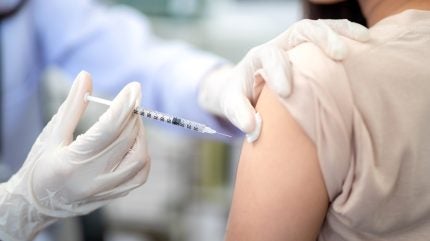
England’s National Health Service (NHS) has said that multiple sclerosis patients could have their hospital treatment time slashed following the availability of a new drug formulation.
Roche’s blockbuster Ocrevus (ocrelizumab) is currently offered on the NHS to multiple sclerosis patients but via twice-yearly intravenous (IV) infusions. Now, in a move that the NHS says will cut the time spent in hospital, the disease-modifying therapy will be administered by quick ‘under-the-skin’ twice-yearly injections.
The ten-minute injection, slated to be available in the coming weeks, is expected to reduce the time spent in hospital receiving treatment by 90%, according to the health agency. It will also benefit patients who have difficult-to-access veins. The NHS will be one of the first healthcare systems globally to offer the new injection.
Nin Sambhi, a patient living with relapsing multiple sclerosis, said an injection “would be so much more convenient for me”.
Sambhi added: “At the moment, it takes around four or five hours to have my infusion and the logistics can be really difficult.”
Ocrevus is a humanised monoclonal antibody designed to target CD20-positive B cells, which play a key role in multiple sclerosis pathology. The drug was first greenlit for use on the NHS by the National Institute for Health and Care Excellence (Nice) for relapsing-remitting multiple sclerosis in 2018, and then for primary progressive multiple sclerosis in 2019. The subcutaneous formulation of Ocrevus garnered European approval earlier this month.
Access the most comprehensive Company Profiles on the market, powered by GlobalData. Save hours of research. Gain competitive edge.

Your download email will arrive shortly
We are confident about the unique quality of our Company Profiles. However, we want you to make the most beneficial decision for your business, so we offer a free sample that you can download by submitting the below form
By GlobalData
The more convenient version of Ocrevus has demonstrated positive results in a Phase III trial. The OCARINA II trial (NCT05232825) showed that 97.2% of patients taking the treatment had no relapse. The study had an annualised relapse rate of 0.04 for up to 48 weeks. The injection’s safety profile was in line with the IV formulation, with no new safety signals observed.
NHS national medical director Sir Stephen Powis said: “This new injection will drastically cut the time that regular treatment takes for those living with multiple sclerosis, meaning that thousands of patients can spend less time in hospital while helping free up clinicians’ time to see more patients, as well as vital capacity onwards.”
Ocrevus is currently one of Roche’s top-selling drugs. It generated sales of $7.1bn in 2023 and is expected to see peak sales of $8.7bn in 2027, according to an analysis by GlobalData’s Pharma Intelligence Centre.
GlobalData is the parent company of Pharmaceutical Technology.
The patent for Ocrevus in European countries is due to expire in 2028, with US protection running out a year later.

Sign up for our daily news round-up!
Give your business an edge with our leading industry insights.
